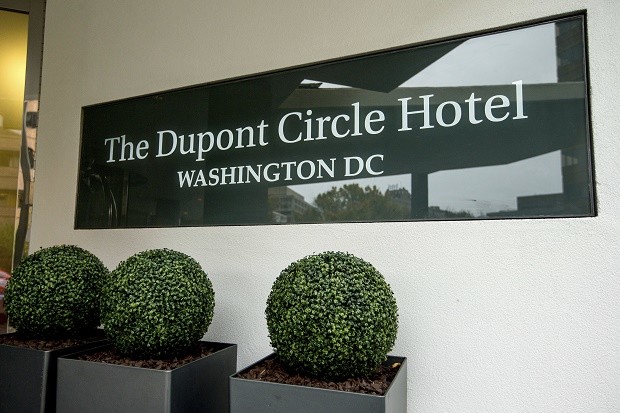
In this Nov. 7, 2015, file photo, the Dupont Circle Hotel in Washington where Mikhail Lesin, a former aide to Russian President Vladimir Putin, was found dead on Nov. 5, 2015. Nearly a year after the curious death of Lesin in the Washington hotel, authorities announced Friday, Oct. 28, 2016, that he died accidentally from numerous bodily injuries after “days of excessive consumption of alcohol.” AP FILE PHOTO
WASHINGTON — Nearly a year after the curious death of a former aide to Russian President Vladimir Putin in a Washington hotel room, authorities announced Friday that he died accidentally from numerous bodily injuries after “days of excessive consumption of alcohol.”
The investigation into Mikhail Lesin’s death has now been closed after the District of Columbia’s chief medical examiner changed the cause of death from “undetermined” to “accident,” the U.S. Attorney’s Office said in a statement. Lesin, 57, was Putin’s former press minister and helped found the English-language news service Russia Today.
Based on video and other evidence and interviews with witnesses, officials said Lesin entered his room at the Doyle Dupont Circle Hotel on the morning of Nov. 4, 2015, after a dayslong drinking binge and was injured while alone in his room. His body was found the next day. Russian news media, citing relatives, initially reported that Lesin had a heart attack.
Blunt force injuries to his head and body were released as the cause of death in March, but authorities didn’t say how he got the injuries.
LaShon Beamon, director of communications for the D.C. Office of the Chief Medical Examiner, confirmed Friday that the death has been ruled accidental with the chief cause listed as blunt force trauma to the head. Contributing causes were listed as blunt force trauma to the neck, torso and upper and lower extremities, along with acute ethanol intoxication. She said District law prevents release of the autopsy report or any other information, though she said the autopsy report can be provided to Lesin’s family.
Annual reports submitted by the medical examiner’s office show that intoxication plays a role in a large number of the accidental deaths investigated by the office.
A day after the autopsy details were released in March, foreign ministry spokeswoman Maria Zakharova said the Russian Embassy made multiple requests for information about the investigation, but received no substantive material. State Department spokesman John Kirby said at the time that State Department officials facilitated communication between Washington, D.C., police and the Russian government. Kirby said he did not know why Lesin was in the country when he died.
On Friday, Russian Embassy spokesman Yuri Melnik declined comment.
Lesin built a career in television advertising in the early 1990s, making his company the industry’s leader. In 1999, he was named Russian media minister and played a key role in getting Putin elected in 2000. Lesin oversaw the Kremlin’s efforts to establish state control over Russia’s top private TV channel, NTV, and helped tame other media.
In 2004 he was named Putin’s adviser, and in the following year oversaw the launch of Russia Today, currently known as RT, a state-controlled channel intended to reach a global audience.
From 2013-2015, Lesin served as the chief executive of Gazprom Media, a state-controlled holding company that includes NTV television along with the nation’s top independent radio station, Ekho Moskvy, and several other media outlets.
Paul Joyal, managing director for public safety and homeland security at Washington-based National Strategies Inc., and an expert on Russian intelligence, said suspicion about Russian involvement in the death is not unjustified.
“Whether it’s an accident or not, I don’t know,” said Joyal, who himself was shot in 2007, in a case that remains unsolved, after criticizing Putin on national television. “But it sure is strange.”
RELATED STORIES